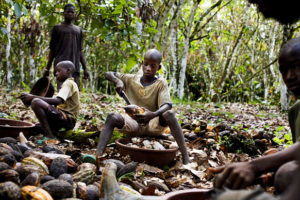
Child labor used to make chocolate (West Africa)
The United Nations reports that there are currently 21 million enslaved people (most of whom come from Africa) forced to do labor that mostly benefit European nations and the west. The amount of money these people have produced is estimated at $150 billion annually.
After 85 years, the United States plan to stop the flow of products that was produced by the work of enslaved people.
The New York Times reports that President Obama has signed legislation that will effectively ban “American imports of fish caught by forced labor in Southeast Asia, part of a flurry of recent actions by the White House, federal agencies, international trade unions and foreign governments to address lawlessness at sea and to better protect offshore workers and the marine environment.”
The new form of legislation, U.S. bill H.R. 644, will close a loophole in the Tariff Act of 1930. The 1930 act was supposed to be a way to end the trade of products produced by slavery, but that was not the case because companies found it more profitable to take advantage of workers and used slavery. The bill will allow enforcement agencies to crack down on slave labor domestically.
“The old system that leaves the door open to child or slave labor if it’s used to make a product that isn’t made here in the U.S. — that system absolutely must end, and it will,” U.S. Senator Ron Wyden, an Oregon Democrat who spoke against the loophole on the Senate floor, said last Thursday in a statement.
In recent months, Nestlé has come under fire for using slave labor in the Ivory Coast to produce cocoa beans for chocolate production. In addition to that, the company has also used Thai slaves for “fish-farming.”
Nestlé may be one of the biggest offenders, but the legislation may not stop the obvious. Companies must supply in order to meet the large demand in the west for chocolate, fish and other food goods the company produces.
“If we know cocoa is being produced on plantations in West Africa using slave labor, and then being imported into the U.S., we still have to allow it in because the U.S. cannot produce enough cocoa to meet U.S. demand,” Kenneth Kennedy, a senior policy adviser for Immigration and Customs Enforcement, said in a December interview.
There have also been cases in California that confirm Kennedy’s statement. Lawsuits starting back in 2012 raised the national radar on major companies that use slave labor. Hershey Co., Mars Inc. has also used enslaved Black people and young children on their chocolate plantations in the Ivory Coast.
California has taken actions into their own hands and required companies with more than $100 million in revenue to publicly disclose their efforts to fight slave labor.
According to Bloomberg Business, U.S. Representative Carolyn B. Maloney, a New York Democrat, wants to apply the California example nationwide and expand it.
The new legislation has great intentions and serves as one of the few bipartisan efforts Republicans and Democrats have successfully passed.


